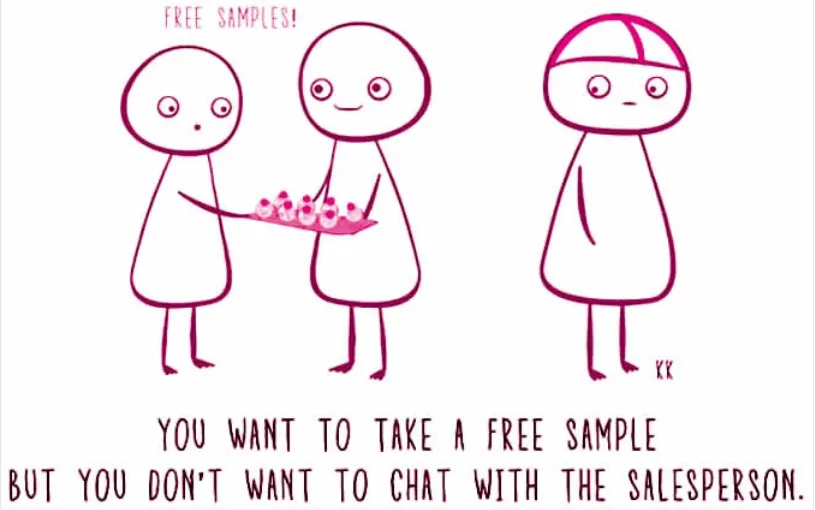Why do millions of Chinese people want to be“Spiritually Finnish”
2019-01-12河南
河南 张 玉
语篇概要
“精芬”指的是那些不喜欢社交的人,他们对待自己的个人空间“极度严肃”。在个人隐私容易遭到侵犯的今天,“精芬”的出现,说明人们在害怕孤独的同时,更渴望得到个人空间和隐私的尊重。对于许多中国人来说,这将是一种真实的情绪。
A Finnish cartoon about a socially awkward stickman has become a hit in China—even inspiring a new word in Mandarin.Why has itstrucksucha chord?

Privacy is something of a luxury in China,a land with a population of 1.4 billion.Personal space is not a concept that ordinary Chinese are familiar with.Pushing andshovingis a basic survival skill in cities.If you fail to push with fellow commuters to get on apackedunderground train,you'll be met with impatient stares.
Theconceptof “private property” or“private space”used to be seriously criticized formerly—and this ideal is very much alive today.Throughout China,people are happy to lie down for a nap just about anywhere:in an office pantry(食品贮藏室),on a park bench,even in a museum or concert hall foyer(门厅),looking as comfortable as if the public space were their own living room.
So it is a surprise to see Matti,a socially awkward Finnish cartoon character in the Finnish Nightmares comic series become something of a celebrity in China's cyberspace(网络空间).A new term in Mandarin has even beencoinedto describe people who are like the hero: jingfen, or “Spiritually Finnish”.According to a widely distributed definition on social media,jingfen broadly refers to people who dislike socialising—like the Finns,apparently and take theirpersonalspace“extremely seriously”.
Matti's fear of crowds and small talk and his tendency to be easily embarrassed has struck a chord with many Chinese readers,who seem relieved that theirlonging forprivacy has finally been voiced—via the medium of a stick figure from a faraway country.But it's Finnish culture itself—of which privacy andpersonal space have long been part—that has also struck a chord.
“Finland is a paradise for people with social anxiety disorder,”wrote WeChat user Zhang Yanmei in a post.“I am a jingfen,please do not disturb me unnecessarily!”wrote an anonymous(匿名的)user in the title of his essay on the website Douban.“Can you see yourself in Matti?”he asked.“He is shy and introspective(好反省的)and the trials and tribulations(苦难)of life are not just Matti's nightmare.We're all afraid of loneliness,but wecraveeven more for our personal space and privacy to be respected.”It is a sentiment(情绪)that willring truefor many people in China.
语言学习
Ⅰ.词汇扫描
1.chord n.弦;和弦;和音
She played some random chords.她随意演奏了几个和弦。
2.strike/touch a chord(with sb)引起同情或共鸣
His arguments struck a chord with Europe's two most powerful politicians.他的论点引起了欧洲两位最有影响的政治家的共鸣。
The speaker had obviously struck a chord with his audience.讲演者显然已引起了听众的共鸣。
3.shove vt.&vi.猛推;乱放
It is hard to shove for attention among multibillion-pound infrastructure projects,so it is inevitable that the attention is focused elsewhere.在数十亿英镑的基础设施项目中很难引起关注,所以人们关注的焦点就自然地转到其他方面了。
Shove it! 去他的,没门儿。
—The boss wants that report now.
—Yeah?Tell him he can shove it.
—老板现在要那份报告。
—是吗?你告诉他没门儿。
4.packed adj.异常拥挤的;挤满人的
The BIO recently held a convention which included sessions to coach lawyers on the shifting landscape for patents.Each meeting was packed.生物技术工业组织最近召开了一次会议,该会议包括一系列的小会议,针对不断变换的专利案对律师进行培训。每场会议都座无虚席。
5.coin vt.制造硬币;杜撰;创造
The term “cardboard city”was coined to describe communities of homeless people living in cardboard boxes.人们创造了“纸箱街区”一词,用来指居住在纸板棚屋里无家可归者的居住区。
be coining it(in);be coining money 暴富;赚大钱;发大财
Many private colleges are coining it.很多私立大学正在大发其财。to coin a phrase套用一句老话;用老话来说
Oh well,no news is good news,to coin a phrase.噢,常言道,没有消息就是好消息。6.long for渴望;羡慕;憧憬
I'm longing for news of him.我正在盼望着得到他的消息。
7.crave vt.&vi.渴望;恳求;请求
I've been craving different foods each day.我一直想要每天吃得不一样。
8.ring true听来真实可靠;听上去是真的
His words ring true.他的话听起来似是真的。
Ⅱ.难句分析
But it's Finnish culture itself—of which privacy and personal space have long been part—that has also struck a chord.但芬兰文化本身——隐私和个人空间一直是芬兰文化的一部分——也引起了人们的共鸣。
本句是一个强调句,被强调的部分是Finnish culture itself—of which privacy and personal space have long been part。
译文助读
为什么数百万人想成为“精芬”
芬兰一部关于社交尴尬的火柴人漫画已经成为中国的热门话题——汉语中甚至出现了一个新词。那为什么它会引起如此强烈的共鸣呢?
在拥有14亿人口的中国,隐私是一种奢侈。个人空间不是普通中国人所熟悉的概念。推搡是城市生存的基本技能。如果你没能和其他通勤者挤上一列拥挤的地铁,你就会遇到不耐烦的目光。
“私有财产”或“私有空间”的概念在过去被抨击——而这种理想在今天依然存在。在中国,人们乐于在任何地方躺下小睡一会儿:在办公室的食品储藏室里,在公园的长椅上,甚至在博物馆或音乐厅的门厅里,看上去公共空间就和他们自己的客厅一样舒适。
因此,在《芬兰人的噩梦》系列漫画中,我们很惊讶地看到:马蒂,一个有着社交尴尬症的芬兰卡通人物,在中国的网络空间里成了名人。汉语中甚至出现了一个新词,用来形容像那主角一样的人:精芬,也就是“精神芬兰人”。在社交媒体上广泛流传的一种定义是,jingfen指的是那些不喜欢社交的人,比如芬兰人,他们对待自己的个人空间“极度严肃”。
马蒂对人群和闲聊的恐惧,以及他容易感到尴尬的倾向,引起了许多中国读者的共鸣。他们似乎松了一口气,因为他们对隐私的渴望终于得到了表达——通过一个来自遥远国家的火柴人的媒介。但芬兰文化本身——隐私和个人空间一直是芬兰文化的一部分——也引起了人们的共鸣。
“芬兰是患有社交焦虑症的人的天堂,”微信用户张艳梅在一篇帖子中写道。“我是精芬,请不要打扰我!”一位匿名用户在豆瓣上的文章标题中写道。“你能在马蒂身上看到你自己的影子吗?”他问道。“他害羞、内省,生活的考验和磨难不只是马蒂一个人的噩梦。我们都害怕孤独,但我们更渴望得到个人空间和隐私的尊重。”对于许多中国人来说,这将是一种真实的情绪。
